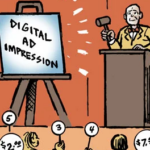 Facebook has decertified more than half the seat holders on its Facebook Exchange (FBX) as part of a revamp of its marketing partner program, unveiled Tuesday. Among the partners no longer badge-certified to buy on FBX are some very big ad platform players, including Adobe, Advertising.com (AOL), Rocket Fuel, IgnitionOne and Dotomi/Conversant (Epsilon).
Facebook has decertified more than half the seat holders on its Facebook Exchange (FBX) as part of a revamp of its marketing partner program, unveiled Tuesday. Among the partners no longer badge-certified to buy on FBX are some very big ad platform players, including Adobe, Advertising.com (AOL), Rocket Fuel, IgnitionOne and Dotomi/Conversant (Epsilon).
In total, the number of publicly listed FBX partners shrank from more than 25 to just 12. Many of the departed vendors will continue to do RTB-based ad buys through Facebook’s APIs and its Custom Audiences program. Others will not, citing rising media costs and restricted access to inventory in the news feed.
Remaining third parties qualified to buy on FBX include TellApart, Triggit, Criteo, AdRoll, AppNexus, MediaMath, Turn and Nanigans. [See the whole list.] Additionally, sources tell AdExchanger that Facebook has granted a small number of partners FBX access without certifying them with a badge. Facebook is not saying which companies are on this silent buyer list, but Google’s DoubleClick Bid Manager and DataXu are two possible candidates.
Downsizing the FBX partner set is consistent with Facebook’s long-range focus on building out its own real-time bidding capabilities through its APIs and Custom Audiences program, which lets advertisers apply first- and third party data to create Facebook audience segments of their customers and prospects. Going forward, Facebook wants FBX to be more purely focused on dynamic product-level retargeting of the sort that has become common in the retail and travel sectors.
Put another way, it made sense to have dozens of FBX partners when FBX was the only way to retarget on Facebook. Now that Facebook offers plain retargeting directly to advertisers, agencies and ad networks, it wants to preserve FBX as a zone for more complex modeling and data-driven use cases. And it is hand-picking the partners that are driving the most spend in this area.
One senior executive at a former FBX-certified company said his firm gladly exited the RTB platform after seeing the mandatory minimum spend required to stay. This person said FBX has been vulnerable to intermediaries looking to game attribution systems.
“FBX favors carpet-bombing with retargeting cookies. There are players out there that made hay with that for a while,” said the executive. “It’s a game that’s going to play out for a little while, and then it’s going to go away.”
While Facebook might do away with FBX if it develops a powerful enough retargeting solution on its own, clearly that day has not yet arrived. One ad tech CEO, speaking on background, said it could take years of development to get to that stage. And given that the platform is still a very large revenue contributor for Facebook – delivering an estimated $500 million in 2014, according to a source – it could be a costly mistake to force migration to a less robust Facebook solution.
For other partners that have left FBX, migrating from FBX to Facebook’s mobile-friendly RTB access only makes sense. (FBX is desktop-only.)
A prime example is Rocket Fuel, whose CMO Eric Porres told AdExchanger, “Rocket Fuel is migrating from FBX to the API because it is more aligned with giving our customers access to a wider range of ad units and specifically, access to the 1.19 billion people who access Facebook via mobile devices monthly. We believe the Facebook API solution is where the broadest inventory (mobile, video) and most robust first-party data sources are available, not FBX.”
Rocket Fuel says it is in the process of developing its integration with Facebook’s API and that once that process has been completed and verified, it expects to be listed as an “Ad Tech” marketing partner.
Here is a partial list of third parties that are no longer publicly certified on FBX: Adobe, Advertising.com, Brand Networks, Chango, DataXu, Dstillery, IgnitionOne, myThings, Netmining, Perfect Audience (Marin subsidiary), Quantcast, Rocket Fuel, Struq, and [x+1].
Update: MyThings and Struq tell AdExchanger they still have access to FBX to run dynamic creatives both on the right rail and in the news feed. We have reached out to Facebook for clarification.













